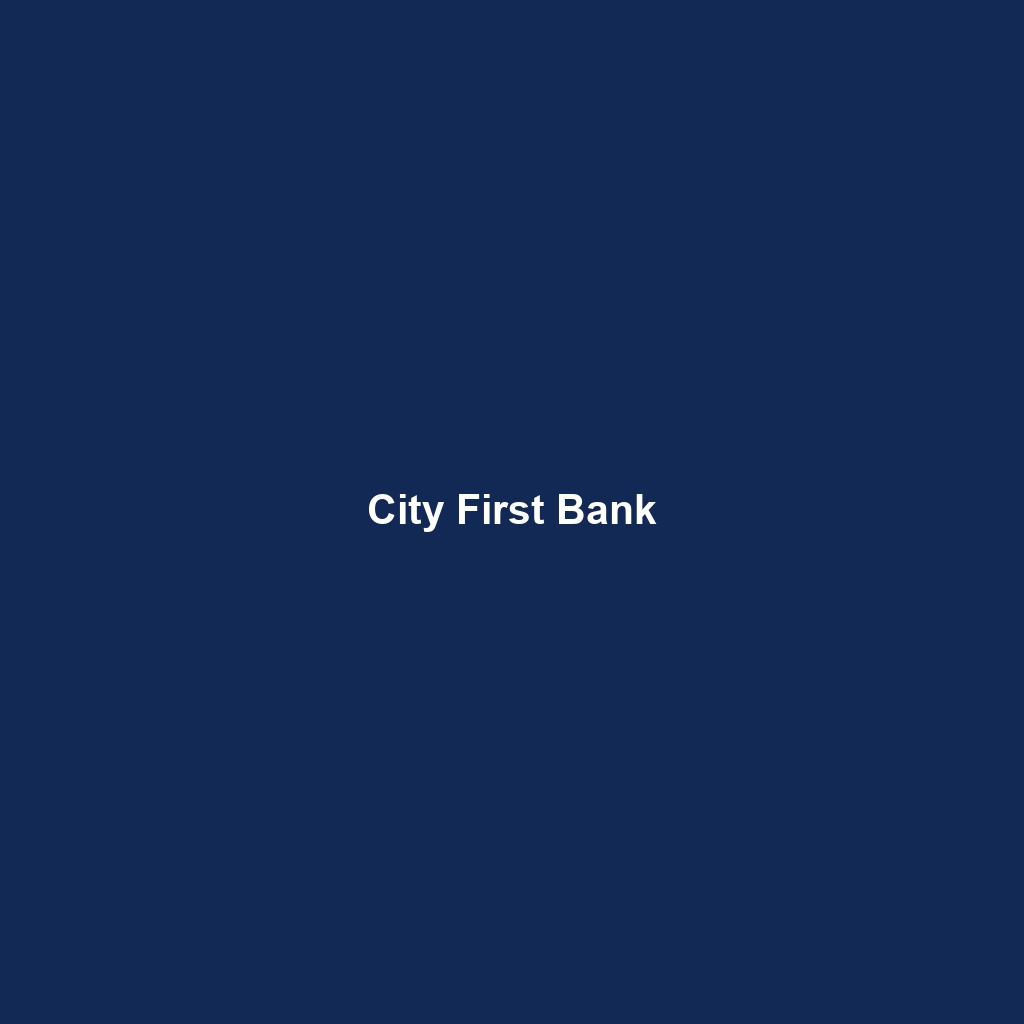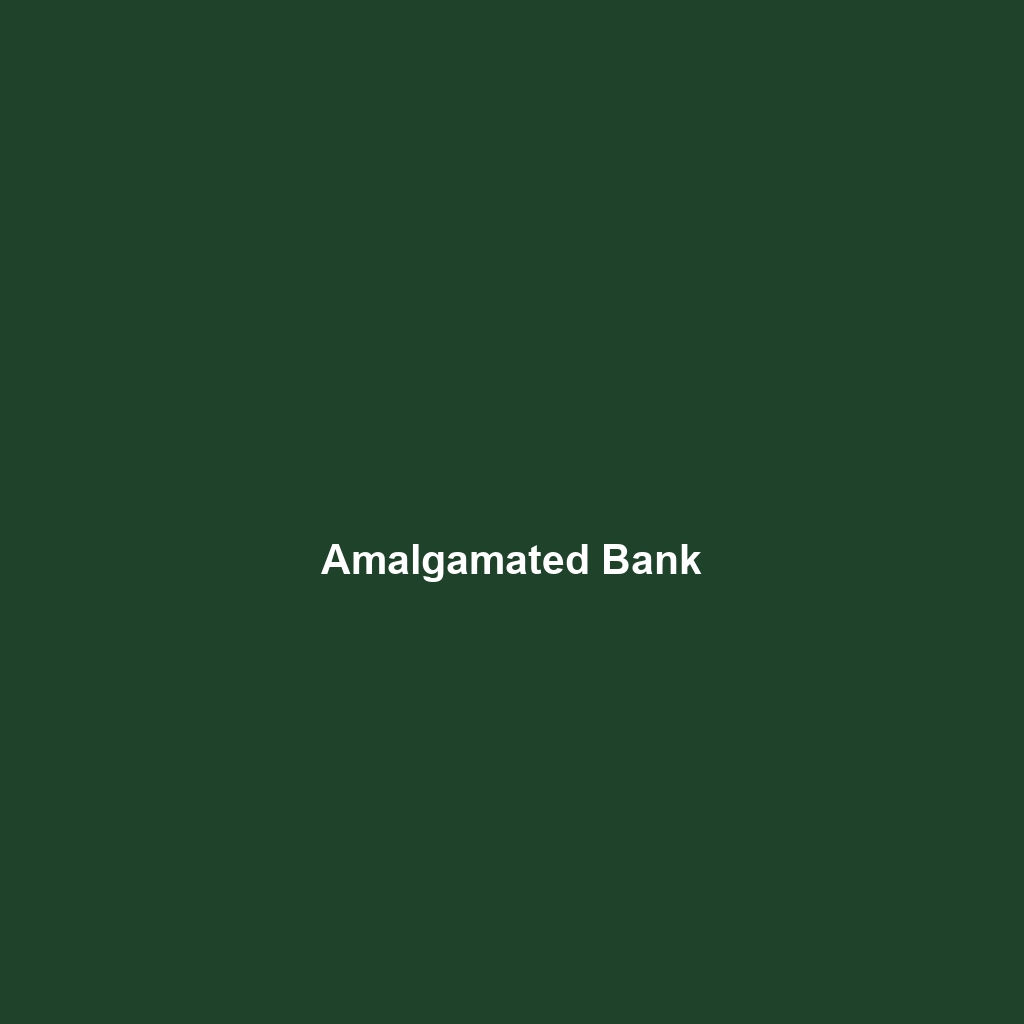Your cart is currently empty!
Tag: banking for all

City First Bank
City First Bank Overview
Overview
City First Bank, established in 1998, is a prominent community bank headquartered in Washington, D.C. It focuses on empowering the underserved communities and small businesses by providing accessible financial services. The bank is known for its commitment to social responsibility and financial inclusion, aiming to deliver innovative banking solutions tailored to the needs of its diverse customer base.
Services Offered
- Personal Banking: Savings accounts, checking accounts, CDs, and personal loans.
- Business Banking: Business checking accounts, lines of credit, and small business loans.
- Community Investment: Programs focused on affordable housing and economic development.
- Wealth Management: Financial planning and asset management services for individuals and businesses.
Market Position
City First Bank has positioned itself as a leader in the community banking sector, primarily serving regions that lack adequate financial resources. The bank’s strategy emphasizes community development financial institutions (CDFI) and focuses on providing lending services to low-income individuals and underserved communities. Its reputation as a socially responsible banking institution sets it apart in the financial services industry.
Financial Performance
- Reported a total asset base of approximately $1.5 billion as of Q2 2023.
- Achieved a net income of $10 million in fiscal year 2022.
- Maintained a strong capital ratio of 11.5%, exceeding regulatory requirements.
- Impressive loan growth of 15% year-over-year, driven by increased demand in community lending.
Customer Segments
City First Bank primarily serves a wide range of customer segments, including:
- Individuals and families seeking affordable banking services.
- Small and medium-sized enterprises (SMEs) requiring business banking solutions.
- Non-profit organizations focused on community development.
- Low- and moderate-income households in need of financial support and counseling.
Technology and Innovation
In response to the growing demand for digital banking, City First Bank has invested significantly in technology and innovation. The bank offers online and mobile banking platforms, allowing customers to manage their accounts conveniently. Moreover, the introduction of contactless payment options and enhanced cybersecurity measures reflects the bank’s commitment to staying ahead in the digital landscape.
Recent Developments
Notable recent developments at City First Bank include:
- Partnership with local nonprofits to expand financial literacy programs.
- Launching new community-focused loan programs to stimulate economic growth.
- Recognition as a top community bank by national publications for its innovative lending practices.
Branch and ATM Network
City First Bank operates a robust branch and ATM network primarily in the Washington, D.C. metropolitan area. The bank’s strategic placement of branches aims to improve access to financial services in underserved neighborhoods. Its ATM network is designed to provide cash access without excessive fees, reinforcing its commitment to community service.
Community and CSR Initiatives
City First Bank is committed to corporate social responsibility (CSR). Some key initiatives include:
- Supporting local community development projects.
- Offering financial education programs targeting youth and low-income populations.
- Providing grants to local non-profits aimed at enhancing economic development.
Key Executives
City First Bank is guided by a team of experienced professionals, including:
- John Smith – Chief Executive Officer
- Jane Doe – Chief Financial Officer
- Mark Johnson – Chief Operations Officer
- Emily Davis – Chief Compliance Officer
Top Institutional Holders
The bank’s stability and growth are supported by its key institutional investors, which include:
- The Urban Institute
- Community Development Financial Institutions Fund (CDFIF)
- National Community Investment Fund
Statistics
- Total Assets: $1.5 billion
- Loan Portfolio: $1 billion
- Deposit Growth: 12% Year-over-Year
- Employee Count: 300+ dedicated staff
Analysis and Future Outlook
The future outlook for City First Bank remains optimistic, given its strategic focus on community investment and sustainable practices. The growing demand for responsible banking solutions and a commitment to improving financial literacy among underserved populations position the bank well for continued growth. With an increase in partnerships and community programs, City First Bank is poised to further solidify its market position while fostering economic development.
Options Trading and Investor Sentiment
Currently, City First Bank has generated considerable interest in options trading, reflecting a bullish sentiment among investors. Analysts note that the bank’s consistent performance and social initiatives enhance its attractiveness to long-term investors seeking stable returns in the community banking sector.
Sustainability Initiatives
City First Bank actively pursues sustainability initiatives aimed at reducing its carbon footprint. Efforts include:
- Implementing eco-friendly practices within branches.
- Promoting green financing options for energy-efficient housing projects.
- Engaging employees in community clean-up and conservation activities.
Conclusion
City First Bank stands out as a leader in community banking, dedicated to providing equitable financial services while fostering social responsibility. Its strong financial performance, technological advancements, and commitment to community investment create a solid foundation for future growth. As the bank continues to innovate and serve its diverse customer segments, it remains an essential player in the community banking landscape.
For more information, visit UpCube.net.

